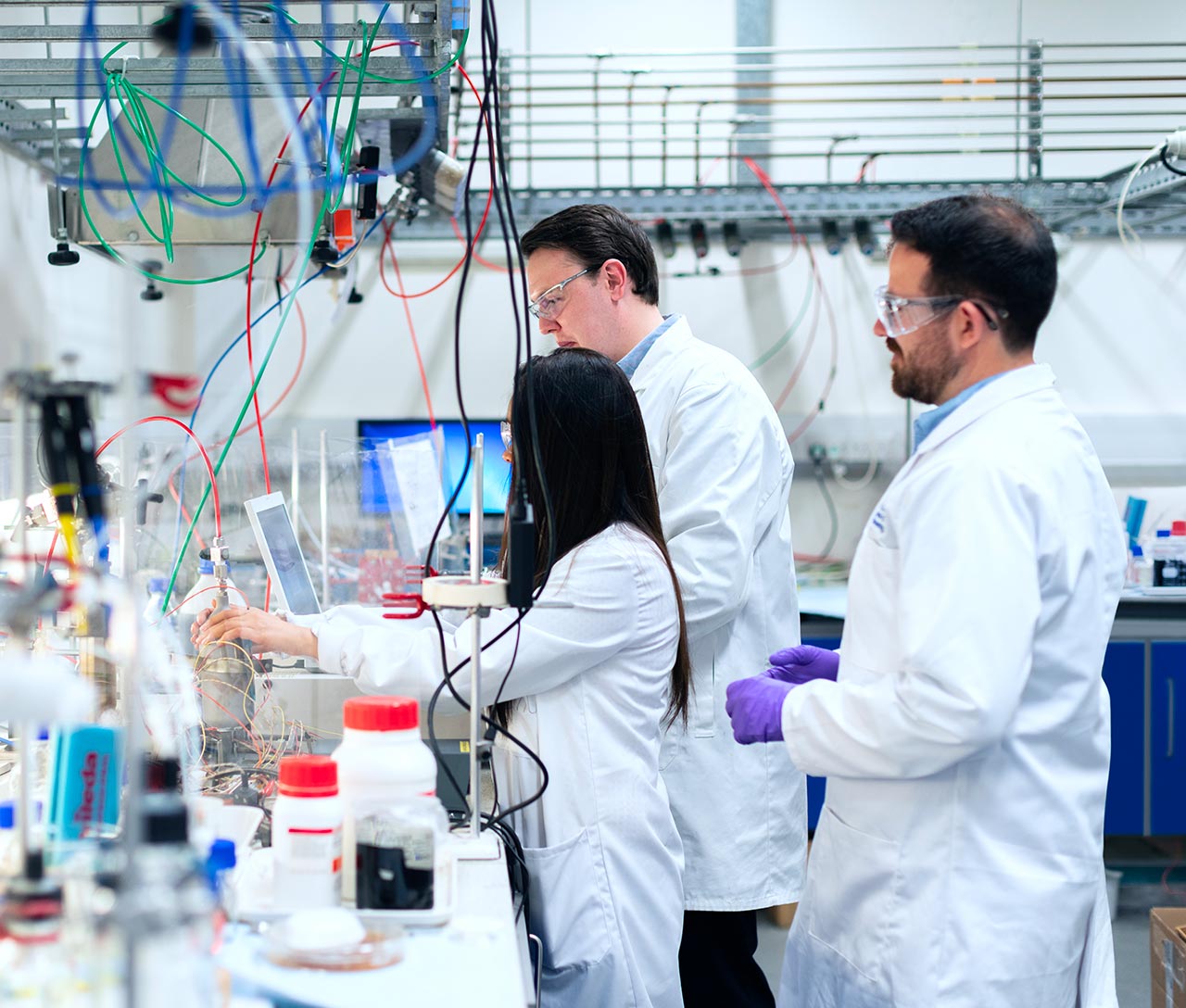Building trust and sustainability
Track and trace for fewer negative headlines
“Higher speed, save costs, optimize human resources, improve quality, meet specifications. Higher, faster, further. And please have it done yesterday.” Out of breath? You’re not alone in this.
Because no matter what the industry, companies have to produce at ever increasing speeds to save time and thus costs in order to remain competitive. But the quality of the end products may not suffer as a result. The use of effective data management and track-and-trace solutions improve your basic fitness for the marathon to the pole position!
The basis for track-and-trace solutions is a comprehensive flow of information
In today’s digitalized production companies, all key figures are obtained in real time and can then be analyzed and processed further. One important aspect is that every part can be located at any time and all information such as serial numbers, locations, order progress, and completion for shipment or sale can be retrieved.
This transparency can only be achieved in the long term if manual progress postings for the orders (start, stop, interrupt, set up, errors, etc.) are completely automated by production staff. Ideally, a track-and-trace solution is coupled with the MES and quality management tools.
This ensures a comprehensive flow of information in real time, which not only generally accelerates business processes in the production environment, but also quickly reveals potential for improvement. Optimized production increases the quality of the end products, and expensive recall actions can be avoided – cash is saved in the long term through the comprehensive use of a track-and-trace solution.
Seamless tracking down to the individual part level
With track-and-trace software, seamless traceability within production processes can be guaranteed. The main goal is to achieve transparency, from the unfinished part through the production process of the individual parts to the final product. This is made possible by linking production orders with the unique serial numbers of the individual parts.
The technology used for this could be, for example, barcodes, labels, FINs, lots, serial and batch numbers, data matrix codes, or RFID chips. If the solution is linked to the MES in a process-oriented manner, all other shop floor data can also be included and linked. Consequently, almost every data record can be assigned to a product by means of track and trace.
Track and trace supports quality management
Quality data and plant malfunctions, among other things, provide concrete information on the production process. If, e.g. a system had a malfunction at a certain point in time, the track-and-trace solution automatically detects which parts could be affected and should be subjected to a possible inspection.
Track and trace is therefore also a supporting tool in the service of production quality. If, for example, process data from an operation are recorded, transmitted to the MES and transferred on the basis of the clear assignment to the workpiece, the necessary machine settings can be aligned with the previously recorded process data.
In addition:
- slight deviations can be corrected in time to maintain quality at the desired level,
- thresholds can be defined and combined,
- accurate delivery data can provide companies with digital traceability that improves order processing.
Traceability in the automotive industry
Especially in the automotive industry, demands for the traceability of products are high. Suppliers, for example, must always be able to provide information about the history of one of their individual parts. Software-supported track-and-trace solutions enable precisely this process by making materials, products, and workpieces transparent throughout the entire manufacturing process. Consequently, car manufacturers can provide complete evidence that a product has passed through all production steps in compliance with specified values.
In addition, the manufacturer has a real-time overview of all faulty production processes at all machines, parts, stations, shifts, and users involved – before a faulty product is delivered. Corresponding corrective measures can then be derived promptly. All in all, all quality assurance requirements with regard to product liability and duty of disclosure can be met.
Thanks to the holistic overview and storage of all production-related data, it is also possible to reduce necessary recalls to a minimum, as the defective batch can be precisely narrowed down. With track-and-trace software, there is no need for time-consuming research and reconstruction of which batches and thus which delivered vehicles this affects – they are displayed digitally at the touch of a button.
Track and trace in medicine and medical technology
Quality requirements are particularly high in the field of medicine and medical technology, making the idea of track and trace very relevant. This includes, for example, compliance with FDA 21 CFR Part 11, which requires medical companies to collect and store a large amount of quality-related data for a certain period of time throughout their entire production and manufacturing process for later use.
In this way, it is possible to trace exactly which individual components are contained in which end product even years later. The use of track and trace does not change the amount of data, rather the handling of the enormous quantity of data and evaluations of it are significantly simplified.
Track and trace promotes sustainability
Environmental protection and sustainability are topics that are becoming increasingly important, and not only for consumers. This is also playing an increasingly important role in the production environment. This is where the “Circular Economy” comes into play – it aims to achieve ecological sustainability in manufacturing. This includes, among other things, reducing or completely preventing avoidable recalls, as these are not only expensive but also produce large amounts of waste.
Track and trace helps to identify initial quality problems immediately and to put them into context with a cause-and-effect analysis. This makes it possible to quickly find explanations as to what extent special constellations in the operating states of the machines have caused a specific problem – and recalls can be limited to precisely those workpieces with an increased probability of error.
Confidence-building core technology
When track-and-trace solutions are used to make product quality and production more transparent, recalls can be handled in a more targeted manner or avoided altogether.
Be it a car or medical device manufacturer: the fewer negative headlines received due to quality problems and recalls, the more conducive for branding and building trust. That’s why we at Germanedge say that with our decades of experience in implementing track-and-trace solutions in the manufacturing industry, both for products and processes, we are able to offer efficient, easy-to-implement software solutions that have been proven hundreds of times over. Track and trace is therefore an integral part of our MES and MOM software in a digital world.
For example, the solution of our product provider QDA SOLUTIONS offers a supporting track-and-trace tool in connection with quality management (QDA traceability). In contrast to the product level, the Germanedge product provider GEFASOFT also offers a process-oriented track-and-trace module linked to the MES Legato Sapient in order to be able to track individual parts of a production facility, which flow through different machines within production lines.

Get in touch!
Would you like to know more about our solutions? Then please write me using the contact form. I will get back to you as soon as possible.

Dominik Weggler
Sales Team Germanedge


